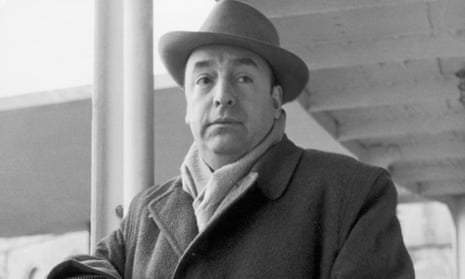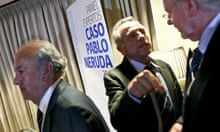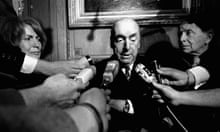Pablo Neruda may have won the Nobel prize for literature in 1971, but newly opened archives in Stockholm reveal the judging panel’s concerns about the Chilean poet’s “communist tendencies”.
The list of writers in the running for the Nobel prize, and the deliberations of the secretive members of the judging panel at the Swedish Academy, are kept confidential for 50 years. But the newly opened archives show that, although 1971’s winner Neruda was praised by the prize-givers for “a poetry that with the action of an elemental force brings alive a continent’s destiny and dreams”, behind the scenes some members of the Swedish Academy were hesitant.
They questioned how works such as Neruda’s odes to Stalin fitted with Alfred Nobel’s stipulation that the prize go to “the person who shall have produced in the field of literature the most outstanding work in an ideal direction” – according to journalist Kaj Schueler, who researched the Swedish Academy’s documents from 1971 for the Swedish newspaper Svenska Dagbladet.
While the Nobel committee chair Anders Österling praised Neruda’s “poetic natural power and dynamic vitality”, he questioned whether “the increasingly dominant communist tendency in his poetry is compatible with the purpose of the Nobel prize”. Neruda, known for his passionate, romantic poetry, was also a leftwing politician and diplomat, and close friend of President Salvador Allende. Neruda died days after Augusto Pinochet’s military coup in 1973, under circumstances that have since been investigated.
“A writer’s way of thinking – whether Marxist, syndicalist, anarchist or something else – belongs to his free right. However, Neruda is fully politically involved, including through his hymns to Stalin and other purely propagandistic achievements. On that basis, I have reservations about his candidacy, without, however, wanting to firmly reject it in advance,” wrote Österling in 1963 – an opinion that he continued to hold in 1971, according to Schueler.
Österling had previously spoken out against the candidacy of Ezra Pound because he “propagates ideas of a nature that is definitely contrary to the spirit of the Nobel prize”, and Samuel Beckett, because of his nihilism. Österling was eventually persuaded of Neruda’s merits, and Beckett won the prize in 1969, but Pound never did.
The opening of the archives also shows that WH Auden, James Baldwin, Philip Larkin and Jorge Luis Borges were all nominated for the 1971 award. Auden made the shortlist, along with Patrick White, André Malraux and Eugenio Montale. White (in 1973) and Montale (1975) would later win, but Malraux and Auden never did.
The list of 90 writers nominated for the 1971 Nobel includes just one woman: the Estonian poet Marie Under.






